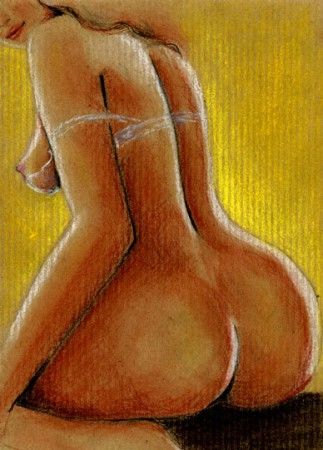Anna Wigandt
Transformation Through The Body
Why have most religions condemned or denied the body? It seems that spiritual seekers have always regarded the body as a hindrance or even as sinful.
Why have so few seekers become finders?
On the level of the body, humans are very close to animals. All the basic bodily functions - pleasure, pain, breathing, eating, drinking, defecating, sleeping, the drive to find a mate and procreate, and of course birth and death - we share with the animals. A long time after their fall from a state of grace and oneness into illusion, humans suddenly woke up in what seemed to be an animal body - and they found this very disturbing. "Don't fool yourself. You are no more than an animal." This seemed to be the truth that was staring them in the face. But it was too disturbing a truth to tolerate. Adam and Eve saw that they were naked, and they became afraid. Unconscious denial of their animal nature set in very quickly. The threat that they
might be taken over by powerful instinctual drives and revert back to complete unconsciousness was indeed a very real one. Shame and taboos appeared around certain parts of the body and bodily functions, especially sexuality. The light of their consciousness was not yet strong enough to make friends with their animal nature, to allow it to be and even enjoy that aspect of themselves - let alone to go deeply into it to find the divine hidden within it, the reality within the illusion. So they did what they had to do. They began to disassociate from their body. They now saw themselves as having a body, rather than just being it.
When religions arose, this disassociation became even more pronounced as the "you are not your body' belief. Countless people in East and West throughout the ages have tried to find God, salvation, or enlightenment through denial of the body. This took the form of denial of sense pleasures and of sexuality in particular, fasting, and other ascetic practices. They even inflicted pain on the body in an attempt to weaken or punish it because they regarded it as sinful. In Christianity, this used to be called mortification of the flesh. Others tried to escape from the body by entering trance states or seeking outof-the-body experiences. Many still do. Even the Buddha is said to have practiced body denial through fasting and extreme forms of asceticism for six years, but he did not attain enlightenment until after he had given up this practice.
The fact is that no one has ever become enlightened through denying or fighting the body or through an out-of-the-body experience. Although such an experience can be fascinating and can give you a glimpse of the state of liberation from the material form, in the end you will always have to return to the body, where the essential work of transformation takes place. Transformation is through the body, not away from it. This is why no true master has ever advocated fighting or leaving the body, although their mind-based followers often have.
Of the ancient teachings concerning the body, only certain fragments survive, such as Jesus' statement that "your whole body will be filled with light," or they survive as myths, such as the belief that Jesus never relinquished his body but remained one with it and ascended into "heaven" with it. Almost no one to this day has understood those fragments or the hidden meaning of certain myths, and the "you are not your body' belief has prevailed universally, leading to body denial and attempts to escape from the body. Countless seekers have thus been prevented from attaining spiritual realization for themselves and becoming finders.
Ekhard Tolle


